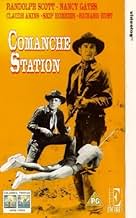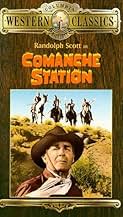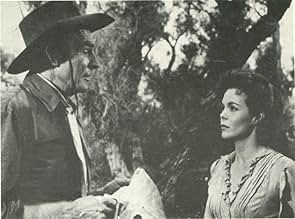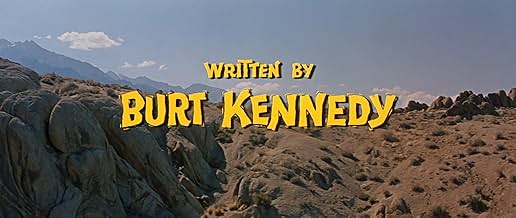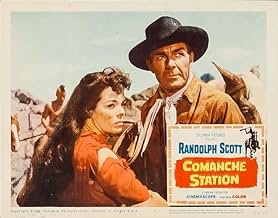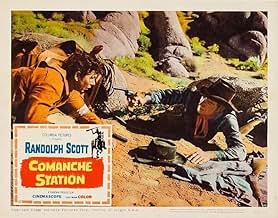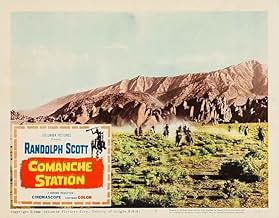PUNTUACIÓN EN IMDb
7,0/10
4,6 mil
TU PUNTUACIÓN
Añade un argumento en tu idiomaA man saves a woman who had been kidnapped by Comanches, then struggles to get both of them home alive.A man saves a woman who had been kidnapped by Comanches, then struggles to get both of them home alive.A man saves a woman who had been kidnapped by Comanches, then struggles to get both of them home alive.
P. Holland
- Lowe Boy
- (sin acreditar)
Foster Hood
- Comanche Lance Bearer
- (sin acreditar)
Joe Molina
- Comanche Chief
- (sin acreditar)
Vincent St. Cyr
- Warrior
- (sin acreditar)
Argumento
¿Sabías que...?
- CuriosidadesLast of the "Ranown Westerns", produced by Randolph Scott and his partner Harry Joe Brown under the Ranown Pictures banner. Scott decided to retire after this one, but two years later he was talked out of retirement by Sam Peckinpah for Duelo en la alta sierra (1962). After that film, Scott retired for good.
- PifiasDuring the final shootout with Claude Akins, Randolph Scott and Nancy Gates run and hide in a small rock cave in the hills. As they look out of the cave, a crew member in a blue shirt stands in the path in front of them. When Randolph Scott leaves the cave, he runs right past this crew member.
- ConexionesFeatured in The Guardian Interview with Budd Boetticher (1994)
Reseña destacada
Howard Hawks was once asked about his recipe for making a great film. His reply: "Three good scenes, no bad scenes". I would humbly add two other rules: A great film is one where no additional scene is needed, and no existing scene could have been cut. Few competent directors violate the first rule. The mark of a great director is the ability to follow the second. Many inferior directors are too shallow or too vain to understand this - they constantly strive to include superfluous or redundant scenes - Just To Make Sure You Got The Point - when it is wiser to let the audience decide what is important. John Ford was the master at this. Hawks, Wilder, Eastwood, also come to mind. With Commanche Station, Budd Boetticher showed that he knew how to distill a great story (with many elements of a Greek tragedy) to its most basic human elements - Obsession, Greed, Loyalty, Irony, and above all, Honor.
Not only did Boetticher direct a great film, Burt Kennedy (later to become a fair director himself) constructed a great script.
Some good scenes: A conversation between a woman who was taken captive by Commanches (and held for a time) and the stranger who has just paid her ransom... Nancy Lowe: If-if you had a woman taken by the Comanche and-and you got her back... how would you feel knowing? Jefferson Cody: If I loved her, it wouldn't matter. Nancy Lowe: Wouldn't it? Jefferson Cody: No ma'am, it wouldn't matter at all.
Or two friends, hired guns both, contemplating the need to commit a horrible crime for money: Frank: You want to go to work, do you? Dobie: Work? Frank: Making an honest living? Dobie: Oh, no, I don't think I could do that. I could cowboy some. Frank: Well, what will that get you? You work yourself to death for somebody and likely they will have to take up a collection to bury you.
Or a conversation between an honorable man and a young man trying to decide whether he will try to become one: Dobie: A saddle and a shirt, that's all Frank had. It sure ain't much. Jefferson Cody: Sure ain't. Dobie: It wasn't his fault, though. Jefferson Cody: No? Dobie: No, he never knew anything but the wild side. Jefferson Cody: A man can cross over anytime he has the mind.
As for the performances, they are uniformly good. Nancy Gates, Skip Homier, Richard Rust, and Claude Akins hit the right tone - never going too far for a laugh or a tear.
And Randolph Scott was perfect - A word I do not use lightly. Roger Ebert once said that Marlon Brando and Paul Newman started out on the same path: Both came on the scene in the early 1950s, both studied the Method, both looked good in an undershirt. But Brando went on to see what else he could throw in to his performances while Newman went on to see what he could leave out (Newman once said that he was dissatisfied with many of his early performances because "you could see the acting"). In Commanche Station, Randolph Scott provided the inspiration for such an approach. This is what makes a performance (indeed, a film) memorable - by distilling your performance to only that which is necessary, you allow the viewer to remember what is important to them, not what they are told should be important to them.
If I were held to only half a dozen westerns to be labeled as essential, this would be one of them (The others: My Darling Clementine (1946), Shane (1953), The Searchers (1956), The Man Who Shot Liberty Valance (1962) and Unforgiven (1992)).
Not only did Boetticher direct a great film, Burt Kennedy (later to become a fair director himself) constructed a great script.
Some good scenes: A conversation between a woman who was taken captive by Commanches (and held for a time) and the stranger who has just paid her ransom... Nancy Lowe: If-if you had a woman taken by the Comanche and-and you got her back... how would you feel knowing? Jefferson Cody: If I loved her, it wouldn't matter. Nancy Lowe: Wouldn't it? Jefferson Cody: No ma'am, it wouldn't matter at all.
Or two friends, hired guns both, contemplating the need to commit a horrible crime for money: Frank: You want to go to work, do you? Dobie: Work? Frank: Making an honest living? Dobie: Oh, no, I don't think I could do that. I could cowboy some. Frank: Well, what will that get you? You work yourself to death for somebody and likely they will have to take up a collection to bury you.
Or a conversation between an honorable man and a young man trying to decide whether he will try to become one: Dobie: A saddle and a shirt, that's all Frank had. It sure ain't much. Jefferson Cody: Sure ain't. Dobie: It wasn't his fault, though. Jefferson Cody: No? Dobie: No, he never knew anything but the wild side. Jefferson Cody: A man can cross over anytime he has the mind.
As for the performances, they are uniformly good. Nancy Gates, Skip Homier, Richard Rust, and Claude Akins hit the right tone - never going too far for a laugh or a tear.
And Randolph Scott was perfect - A word I do not use lightly. Roger Ebert once said that Marlon Brando and Paul Newman started out on the same path: Both came on the scene in the early 1950s, both studied the Method, both looked good in an undershirt. But Brando went on to see what else he could throw in to his performances while Newman went on to see what he could leave out (Newman once said that he was dissatisfied with many of his early performances because "you could see the acting"). In Commanche Station, Randolph Scott provided the inspiration for such an approach. This is what makes a performance (indeed, a film) memorable - by distilling your performance to only that which is necessary, you allow the viewer to remember what is important to them, not what they are told should be important to them.
If I were held to only half a dozen westerns to be labeled as essential, this would be one of them (The others: My Darling Clementine (1946), Shane (1953), The Searchers (1956), The Man Who Shot Liberty Valance (1962) and Unforgiven (1992)).
- ttbird2000
- 26 jul 2007
- Enlace permanente
Selecciones populares
Inicia sesión para calificar y añadir a tu lista para recibir recomendaciones personalizadas
- How long is Comanche Station?Con tecnología de Alexa
Detalles
- Fecha de lanzamiento
- País de origen
- Idiomas
- Títulos en diferentes países
- Estació comanxe
- Localizaciones del rodaje
- Empresa productora
- Ver más compañías en los créditos en IMDbPro
- Duración1 hora 13 minutos
- Relación de aspecto
- 2.35 : 1
Contribuir a esta página
Sugerir un cambio o añadir el contenido que falta

Principal laguna de datos
By what name was Estación comanche (1960) officially released in India in English?
Responde

